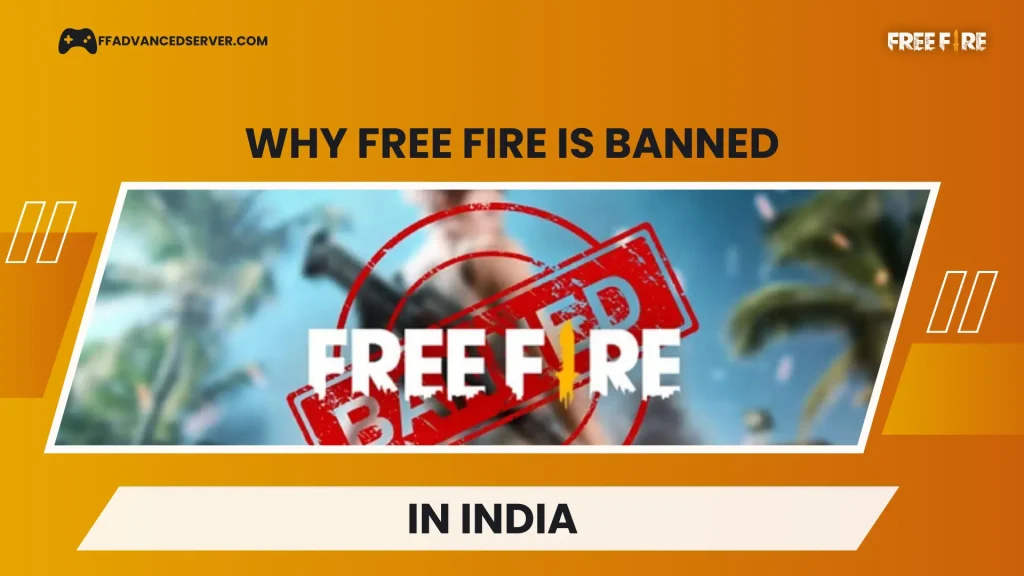Why is Garena Free Fire Banned in India?
Garena Free Fire, a popular battle royale game, was banned in India in February 2022. The game had millions of active players, and its sudden removal surprised many people. To understand why it was banned, we need to look at the reasons behind the decision and the situation of online gaming in India. You can still try the FF Advance Server APK to enjoy upcoming Free Fire features.

Reasons for the Ban
Security Concerns
One of the main reasons Garena Free Fire was banned in India is because of security and data privacy concerns. In the past, the Indian government has banned many apps that were suspected of sharing user data with foreign countries, especially China. Free Fire’s parent company, Garena, is based in Singapore, but its links to other companies connected with China raised concerns. Authorities worried that personal data from Indian players might be accessed and misused.
Links to Chinese Apps
Another big reason for the ban was that Garena Free Fire was linked with PUBG Mobile, a game that was banned in India in 2020. PUBG Mobile was very popular and had a format similar to Free Fire, but it was developed by a Chinese company. Even though Free Fire is not directly owned by a Chinese company, it uses some similar technology and business practices, which made the Indian government suspicious.
The government has been careful about apps with Chinese ties because of national security concerns, especially after border tensions between India and China.
Addiction and Mental Health Issues
Another reason for the ban could be the effect of gaming on young players’ mental health. People were worried that games like Garena Free Fire, which are addictive and played for long hours, were harming the well-being of children and teenagers. Playing too much can cause problems like poor focus, trouble sleeping, and unhealthy habits. The Indian government has been taking steps to protect young people from these risks of online gaming.
The Role of Online Gaming Regulation
India does not have strict rules for online gaming, and many games were played without proper control. This caused worries about cybercrime, addiction, and even money fraud linked to online games. While games like Free Fire are fun, they can also make players spend too much money on in-game items. Since there are no clear laws to manage this, the government decided to ban some games to protect users.
The Impact of the Ban
The ban of Garena Free Fire had a big effect on players in India, where millions enjoyed the game. Many were upset and frustrated because they had spent a lot of time and money on it. The ban also hurt content creators, streamers, and esports players who earned money from Free Fire.
But the ban was not only about Free Fire. It was part of a bigger move by the Indian government to be more careful about which apps can run in the country. The main goal is to protect the privacy and safety of people, especially children and young players.
Steps by the Developers of Free Fire
Even though Garena Free Fire is banned in India, many players still try to play it by using Virtual Private Networks (VPNs). But this is risky because it can cause security problems, and using a VPN for a banned app might even get a player’s account banned.
The ban has also made people think more about the rules for online gaming. It started talks about how to keep gaming fun but also safe, especially for kids and teenagers. As the Indian government keeps checking the safety of online apps, more games may face the same problems in the future.
Read More On Free Fire
- How to get Free Emotes in Free Fire?
- Free Fire Graphics Settings for Smooth and Lag-Free Gameplay
- How to Play Free Fire on PCs and Laptops Using Emulators
Conclusion
Garena Free Fire was banned in India mainly because of worries about data privacy, its connection to Chinese companies, and the harmful effects of too much gaming. Even though millions of people loved the game, the government wanted to keep users safe and healthy. As online gaming keeps growing, it is important for players, developers, and the government to work together to make gaming safer and more responsible.

